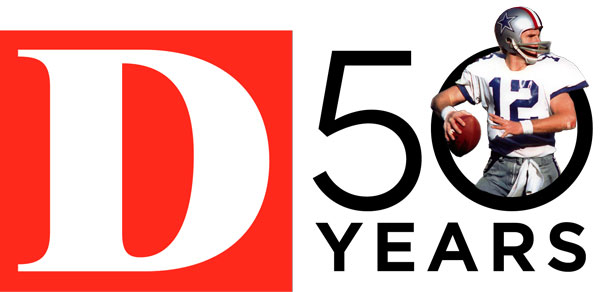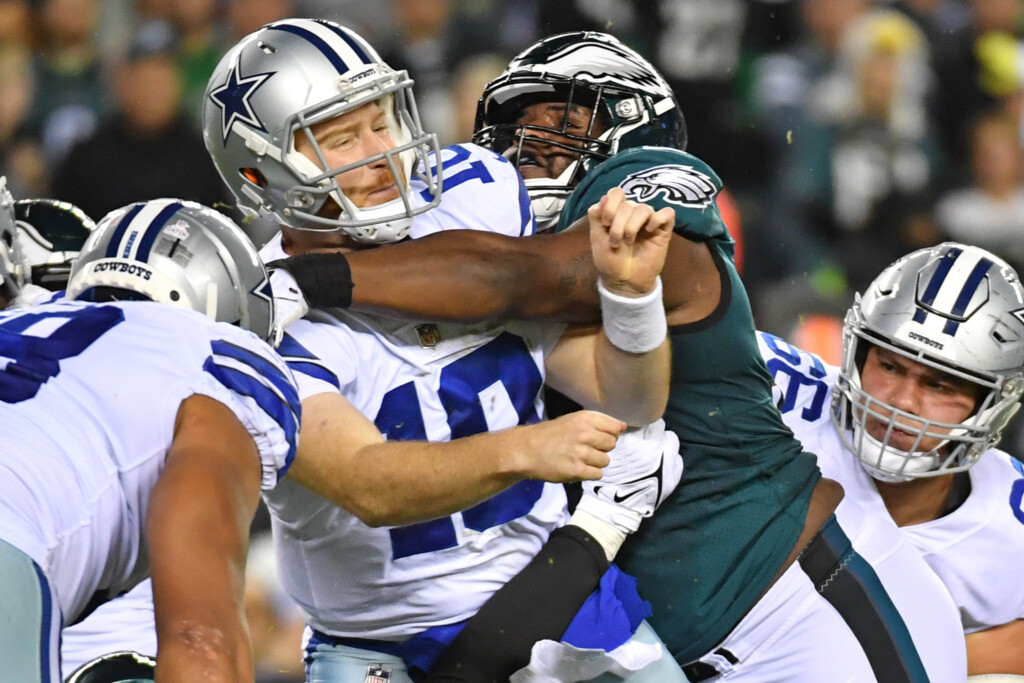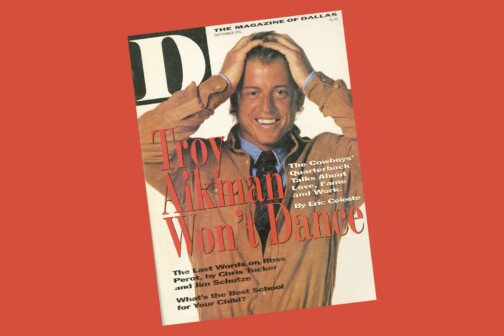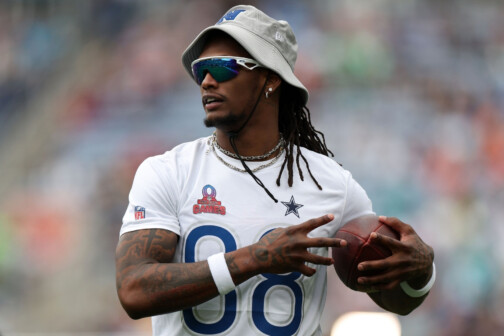The Cowboys’ win streak is over, as Dallas couldn’t overcome the undefeated Eagles in Philadelphia. Here’s what got accomplished in the 26-17 loss on Sunday night:
Succumbed to the inevitable ✔
For the last month, much of this column has focused on the winning formula that saved the Cowboys’ season. The formula made its debut against Cincinnati, was refined against New York and Washington, and got rubber-stamped in Los Angeles against the Super Bowl champions. Four weeks in a row, Dallas leaned on the same strategy to deliver a victory. Four weeks in a row, it worked.
But even as the wins stacked up, it was hard to ignore the flaws in the game plan. For starters, the use of a definite article: there was only the game plan because Dallas could play one way and one way alone with Cooper Rush under center. If a team beat the Cowboys to the game’s first touchdown, there would be no more working around their limited backup quarterback. He would have to rescue them.
As feared, Philadelphia was that team. The Eagles’ 20-point second-quarter barrage was every bit the performance one would expect of the NFL’s last unbeaten team, a setting of terms that Dallas was not equipped to answer.
That failure was bigger than Rush, mind you. The quarterback threw three picks and could have tossed five, but he wasn’t the Cowboy who jumped offside on the crucial fourth-and-4 at the end of the first quarter to hand over a fresh set of downs inside Dallas’ 10-yard line (Dante Fowler made that mistake).
Nor was Rush the one who biffed the offensive possession two series later, when Mike McCarthy opted not to take a timeout to review CeeDee Lamb’s third-down lunge that was incorrectly ruled short of the sticks. According to NBC’s rules analyst Terry McAulay, it was “absolutely a first down.” Then it got worse, as McCarthy decided not run on fourth-and-inches, instead putting the ball in Rush’s hands for an ill-fated downfield pass to Peyton Hendershot.
Rush’s teammates were the ones who committed 10 penalties for 72 yards, even if 30 of them—the unsportsmanlike conduct calls on Micah Parsons and on Trevon Diggs for removing his helmet to throw a tantrum—say more about the officiating and the NFL’s buttoned-up culture than the Cowboys themselves.
And for all the deserved acclaim about a third quarter in which the Cowboys outgained Philadelphia 165 yards to 6, the biggest catalyst in their comeback was Eagles right tackle Lane Johnson. Only when the three-time Pro Bowler departed with an undisclosed injury did the dam fully burst for Dallas’ pass rush, allowing the defense to clamp down on Philadelphia’s passing attack. It still wasn’t enough to prevent the Eagles’ final touchdown: a 13-play, 75-yard, clock-burning grind featuring 10 rushing attempts.
But Rush shrunk the margins, giving Dallas far fewer outs than a playoff team—which the Cowboys were last season and now reasonably should be again this season—ought to have. Every game he started was a game in which each component of his supporting cast needed to perform near its apex for the formula to succeed. No team can sustain that indefinitely, which meant there was always an unseen sell-by date lurking beneath the surface. On Sunday, the Cowboys reached it.
Became entangled in a Pennsylvania political imbroglio ✔
Did John Fetterman, America’s greatest shitposting politician, somehow manage to weave this football game into his Senate campaign against Dr. Oz?
Of course he did!
Now that Dr. Oz is running for office, he *acts* like he’s a real Philly sports fan. But we all know he’s really a Cowboys fan 🙄
— John Fetterman (@JohnFetterman) October 11, 2022
Our beautiful new billboard at the Linc won't let you Iggles fans forget it 🏈 pic.twitter.com/CIpe0FdtiG
The Cowboys would be 5-1 if their offense had been that effective last night.
Turned back the clock ✔
Keen observers of this football team, especially ones who read StrongSide, have known for some time that Ezekiel Elliott is the second-best running back on this football team. But just because Tony Pollard should be the focal point of the run game doesn’t mean that Zeke is useless.
USA Today’s Joey Ickes summed up the backs’ respective selling points rather nicely last week, which more or less boiled down to Elliott delivering the grimy yards and Pollard the drive-making ones. They’re a lovely tandem, and if there’s critique to be found, it’s that Elliott used to play both roles on his own.
But every now and again, we get flickers of the back Elliott once was and still is paid to be. This third-quarter touchdown run was one of them:
Zeke goes untouched into the end zone! @DallasCowboys cut the lead to 20-10.
— NFL (@NFL) October 17, 2022
📺: #DALvsPHI on NBC
📱: Stream on NFL+ https://t.co/exBLpcJhjS pic.twitter.com/64AYI9Rgps
That run was the highlight of Elliott’s night, but it was hardly the only notable moment. This was far and away Zeke’s best game of the year, both in rushing yards (81) and efficiency (6.2 yards per carry, a full yard more than his previous best, in the season opener). It was a reminder of a time when he was the most feared rusher in the game.
Considering the circumstances, there are only so many regrets the Cowboys should have about their performance Sunday. Dak Prescott’s return ensures that there are better days coming for this team. But there is no such guarantee for a running back well into his 20s, with a lot of yards on his odometer.
There are only so many games a year when this Elliott shows up. Dallas got one, and it couldn’t capitalize.
Treated us to what should have been the catch of the year ✔
The NFL, slaves to law and order: this brain-breaking Noah Brown catch did not meet the definition of a completed catch, and therefore was not a touchdown.
The touchdown is overturned. The acrobatics from Cowboys WR Noah Brown still impressive.pic.twitter.com/QMb7isQiTn
— Jori Epstein (@JoriEpstein) October 17, 2022
Me, enlightened and free:
Rules are arbitrary expressions of humanity's desire for order at the expense of embracing the fear and freedom of possibility.
— Mike Piellucci (@mikelikessports) October 17, 2022
Which is to say, let the touchdown stand because it was cool as shit
Got a little taste of Landon Dickerson down their throats ✔
At least according to Cris Collinsworth—and, yes, this is a real thing he said on air:
Omg he actually said this pic.twitter.com/JUh0MCxI7K
— Jomboy Media (@JomboyMedia) October 17, 2022
From a football standpoint, he wasn’t wrong.
In the broader sense? It damn sure wasn’t right, either.
Completed the season’s first act ✔
One final word on Cooper Rush: he did his job. This, I feel, has been lost in the Jerry Jones-perpetuated discourse about the Cowboys’ fake quarterback controversy. (If you haven’t already read Austin Ngaruiya’s excellent piece on that, I recommend you make time for it.)
The greatest casualty of five weeks of frothing over hypotheticals—whether Rush could succeed in this job, or should be given the chance to, or how Prescott might have played in these five games, and what this all means—was that he was asked only to try and keep the season from plunging into the abyss. It is no failure that he, a 29-year-old undrafted free agent turned journeyman backup, could not be the one to defeat the team nobody else has, either.
No, Rush was a success, because however limited Dallas’ winning formula was, not every backup quarterback could have pulled it off. It worked because of the pass rush, and the opportunistic secondary, and Brett Maher’s resurgence, and the occasional explosive play mixed in. But it also worked because, until Sunday, Rush played within himself. He curtailed the mistakes, and he didn’t wilt under pressure, both the kind that squirts past mediocre offensive lines and the kind that manifests in late-game situations. He delivered everything that reasonably could have been asked of him and then some.
And because of that, Rush, the formula, and everything else that marked the first month and a half can now become a preamble to what will really define Dallas’ season: how this team plays once Dak Prescott is back in the lineup. Whenever this season ends, in January or perhaps beyond that, we won’t dwell on this chapter. The Cowboys’ successes or failures will hinge on the team they are at the peak of their powers, not the team they are at their most limited. If somehow, some way, they win the Super Bowl, Cooper Rush will be well down the list of players vying for MVP honors. If they disappoint yet again, you won’t find him near the list of scapegoats, either.
Just know that, no matter what comes, none of it would be possible without him. Even if the conversation surrounding him stretched a few turns past where it should have.
Get the ItList Newsletter
Author






